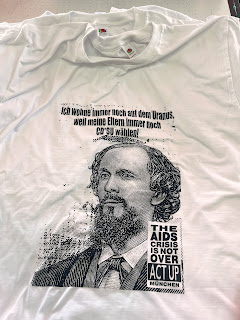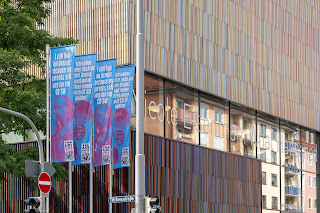 |
| Courtesy: BQ Gallery, Berlin |
Film screening, Conversation and Music | General Idea
Projection on the Crisis
With Philipp Gufler, Marc Siegel, Susanne Sachsse and Zippora Elders, moderated by Kelly Krugman
Friday, 12.1.2024
16:30–19:00
Gropius Bau, Cinema (Lower ground floor)
In German and English
Free admission
Philipp Gufler’s video installation Projektion auf die Krise (Gauweilereien in München) takes a kaleidoscopic glance back to the early days of the AIDS crisis in Germany in the 1980s – a time when Munich’s repressive policy against homosexuals reached its peak. The work assembles archival documents such as newspaper articles, advertisements, photos and press reviews from this period. The historical material comes with commentary and analyses by other artists.
The film screening will be followed by a conversation between Philipp Gufler, Marc Siegel and Zippora Elders as well as music by Susanne Sachsse.
As a professor for experimental film, Marc Siegel will engage with these topics and reflect on the historical contexts in Germany and the USA.
The artist Philipp Gufler combines various media in his work, including screen prints on fabric and mirrors, artist books, performances and video works. For the video installation Projektion auf die Krise (Gauweilereien in München) (2014), he began his research in the self-organised Forum Queeres Archiv München, of which Gufler is an active member. Gufler was awarded with the Media Prize of the German AIDS Foundation in 2020.
Kelly Krugman (she/they), born in 1994, New Jersey, is a Mexican-American curator, editor and project coordinator at SAVVY Contemporary in Berlin, Germany. She co-founded SAVVYZAAR, the radio pillar of SAVVY Contemporary, which is dedicated to the sonic as a space of healing, catharsis and protest. They have been part of curatorial teams of projects spanning exhibitions, publications and public programmes in Berlin and abroad.
Susanne Sachsse was born and raised in the GDR. She is a Berlin-based artist and co-founder of the art collective CHEAP. Her most recent works include sound, video and object installations, which have been shown at Künstlerhaus Bethanien (2022) and the Kestner Gesellschaft (2023), among others. Her first solo exhibition opened in 2021 at PARTICIPANT INC in New York.
Marc Siegel is Professor of Film Studies at the Johannes Gutenberg University in Mainz. His research focuses mainly on issues in Queer Studies and experimental film. He is a member of the Academy of the Arts of the World in Cologne and part of the advisory board of the Forum Expanded section of the Berlinale.






















































